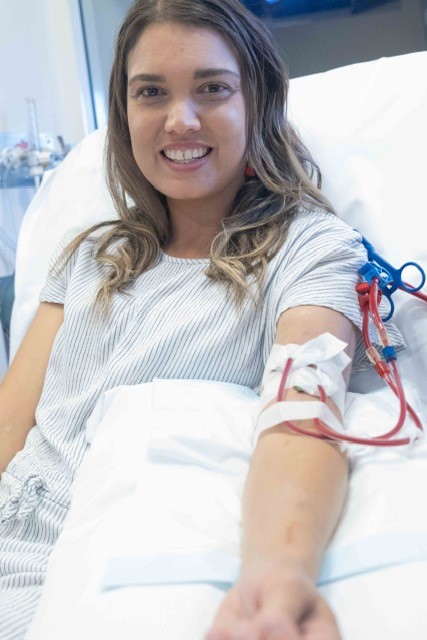Diagnosed with kidney disease at age 12, Bec Vallee always knew she wanted to be a nurse to one day help others.
Now she is prepared to sacrifice everything to help her daughter.
At 17, Bec received a donor kidney from her mother Kathy, which enabled her to travel, finish university, and fulfil her dream of becoming a nurse.
Now 31, Ms Vallee has taken leave from her job as a nurse educator with West Moreton Health because her body has begun rejecting the donor kidney.
“My kidney function is under 5 per cent, so it is just not possible to work and manage my health issues and family life, as I am constantly fatigued,” Ms Vallee said.
She has returned to the kidney transplant waitlist and haemodialysis, a treatment that mimics the role of her kidneys in cleaning her blood.
Her husband Ryan planned to donate one of his kidneys until a pre-natal scan revealed their unborn child also had abnormal kidney development.
It was then realised that Ms Vallee’s condition was a rare genetic kidney disease which her daughter had inherited.
Ambrosia, now 2, will eventually require a kidney transplant and the couple hope, when the time comes, Ryan’s kidney will be a suitable match.
Ms Vallee is now waiting for a deceased kidney donation, which given the low rate of organ donation and suitable matches in Australia, may take years.
She has returned to a regimen of renal dialysis three days a week for six hours at a time.
Ms Vallee is sharing her story as part of DonateLife Week.
This year, DonateLife aims to eliminate the myths surrounding organ donation and show people how lives are changed for the better.
In addition to organs, donated tissue such as skin helps burns patients recover. Corneas (the clear surface of the eye) restore precious sight and the donation of other tissue, such as bone and knee cartilage, help people walk and resume an active life.
The team at West Moreton Health hopes the 2021 DonateLife awareness campaign will encourage people to register for organ donation and save more lives, including that of Ms Vallee, who is one of their own.
Kate Robinson, Donation Specialist Nurse at Ipswich Hospital, said organ donation was a rare occurrence. Fewer than 2 per cent of people who die in hospital are medically able to donate.
“It’s something we only see a couple of times a year, if we are lucky, at Ipswich Hospital,” Ms Robinson said. “You need all the stars to align. There are so many steps in the organ and tissue donation process, that any one of them can put a halt on the process.
“This year, we are participating in several initiatives to increase registrations in the West Moreton region, including the Great Registration Race, which aims to get an extra 100,000 Australians to sign up. We hope to gain new registrations from as many eligible people living in the West Moreton region as we can.”
Look out for the magenta lights around Brookwater and broader Ipswich from 25 July to 1 August in recognition of DonateLife Week.
You can message Bec and her family your support, make a donation or join the Great Registration Race, by visiting the Ipswich Hospital Foundation website: https://www.ihfoundation.org.au/donatelife/
| Myth: I’m too old to be an organ and tissue donor. Fact: Age is NOT a barrier - people over 80 have become organ and tissue donors. |
| Myth: Organ and tissue donation is against my religion. Fact: All major religions support organ and tissue donation as an act of compassion and generosity. |
| Myth: I'm not healthy enough to donate. Fact: People who smoke, drink or have an unhealthy diet can still donate. You don’t have to be in perfect health to save lives. |
| Myth: I can’t be an organ and tissue donor because I lived in the UK. Fact: You can donate your organs, but not your tissues. |
| Myth: It's better to just let my family decide at the time. Fact: If you want to become an organ or tissue donor, you need to tell your family. It will help them at a difficult time. |
| Myth: I’m already registered on my driver’s licence. I don’t need to do anything else. Fact: You need to join the Australian Organ Donor Register at donatelife.gov.au and tell your family. |
| Myth: Organ and tissue donation disfigures the body. Fact: Organ donation is specialised surgery and does not disfigure the body. |
| Myth: Doctors won’t try as hard to save my life if I’m a registered organ donor. Fact: Saving your life is the absolute priority of all medical staff. Organ and tissue donation is only considered when the person has died or death is inevitable. |
